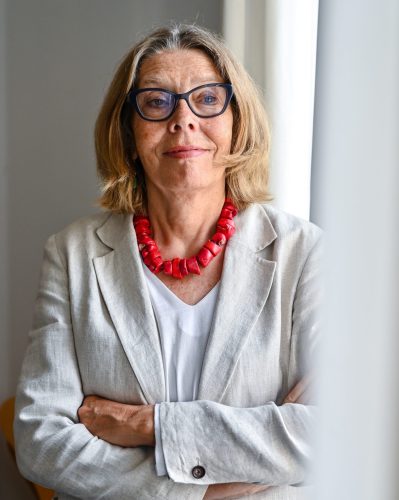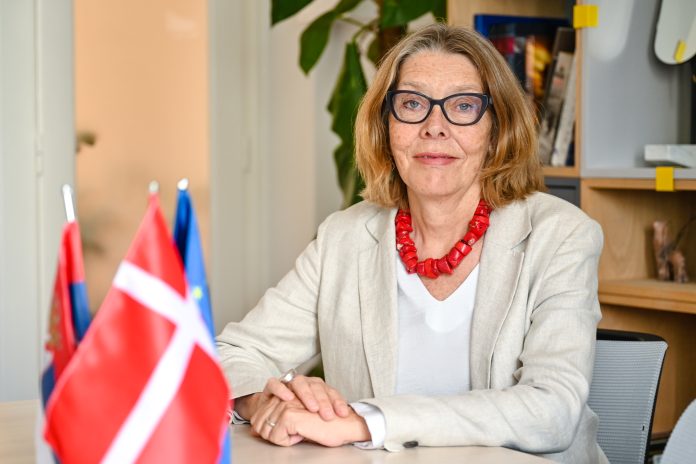Montenegro is the country forerunner in the process of enlargement and integration into the European Union. As the only country of the Western Balkans that has opened all the clusters, in my opinion, Montenegro has a very encouraging position, said Pernille Dahler Kardel, the Ambassador of Denmark in Montenegro.
In the second half of the year, Denmark will preside the EU, and Dahler Kardel speaks about priorities and challenges….
– Enlargement of the EU to the countries of the Western Balkans will probably be high on the agenda of your country’s presidency in the European Union. How do you see the position of Montenegro in that context, particularly after it obtained the positive IBAR?
– Montenegro is a forerunner in terms of the enlargement and integration into the European Union. As the only country in the Western Balkans that has opened all clusters, in my opinion, Montenegro has a very encouraging position. On the path to meet the requirements within the chapters 23 and 24, the positive IBAR shows that the country is ambitious and focused on acquiring EU membership by 2028. That being said, of course, Montenegro needs to continue the reforms to meet the remaining benchmarks. All 33 chapters are opened, seven chapters have already been closed, but there are 26 chapters more to close before reaching the goal. So, I would say, keep up the good work, focus on achieving the progress needed to close more chapters and getting closer to the end goal. Important and hard work is yet to be done.
Montenegro is currently the most advanced country in the process of accession to the EU, where it is making an enormous progress and we are fully committed to supporting it in this important work on this significant path.
Enlargement is important both for the EU and for the Western Balkans. In these times of uncertainty, we must be united and make the European Union stronger. It takes efforts. But Montenegro’s hard work and commitment prove that optimism about being a member of the EU is there, but the process requires efforts.
– What do you think about Montenegro on its European path and what should we focus on during the Danish Presidency?
It is indeed impressive to follow the commitment and determination that Montenegro has been showing on its European path. It is an example of efforts that do not come from the Government or institutions only, but from the entire society. It really takes the entire society to be involved to reach the final goal, membership in the EU.

As for the path ahead, Montenegro should focus on the remaining open chapters, like 23 and 24, to ensure that the reforms are truly implemented not only in the laws but in practice too. Rule of law is the essence of European values, and that is why you should keep working on these chapters and stay focused. Chapter 27 that deals with the environment is also very important and challenging and is an enormous priority for transformation of the society towards sustainability. We are, actually, considering how we could provide you with support in the remaining chapters and, in particular, how to support you on a more technical level in the chapter 27.
– From your point of view, what will the European path of the region look like in the future, particularly when it comes to Montenegro, in the context of all current developments in the EU and expectations that EU has in relation to the countries of the region?
If we look at it from a perspective of geopolitics, enlargement is a huge priority. Russian war of aggression in Ukraine was a wakeup call for all of us. We need a stronger Union that can better protect its positions. A part of it is a bigger Union and the Union that is more capable to defend itself. Ukraine is important, but the Western Balkan countries are equally important for that.
I can only encourage relevant stakeholders to engage and dedicate time to implementation of reforms that will ensure closing of chapters. We as the Embassy will support the countrt in achieving the required progress.
– Do you expect EU to continue strongly supporting the reforms in the field of the rule of law in Montenegro?
Definitely. Rule of law is the essence of European Union. The Union is based on the shared values – and those values are founded and rooted in the rule of law. We should not forget that the enlargement is a new momentum for the European Union and that we will support as much as we can the process of achieving the required progress in the field of the rule of law.
– What is your opinion about bilateral relations between Denmark and Montenegro?
Denmark and Montenegro share decades of partnership and good relations. Recent opening of Montenegrin Embassy in Copenhagen is a significant proof not only of continuously good relations, but also of the importance of our partnership. So, we are indeed very happy that we have confirmed that by extending our operational work.
Progress in the rule of law, dedication and encouragements from the society that we can see in Montenegro largely correspond to our values and therefore I would say that we share some good values and attitudes about important issues. We fully support the process of Montenegro’s accession to the EU and are optimistic about the progress that is being achieved.
However, our relations are not only diplomatic ones, because Montenegrin diaspora has developed precious ties between our countries. Although not big in size, Montenegrin diaspora has an exceptional feeling for keeping the strong connections with Montenegro – as is actually the case also in the entire Western Balkans. Although very well integrated into the Danish society, the diaspora still maintains strong connections with Montenegro – through family ties, social and cultural events, some values and traditions that Denmark can also learn a lot from.
By Marko Vešović, Portal RTCG
This text was published in the 16th issue of Eurokaz magazine.


